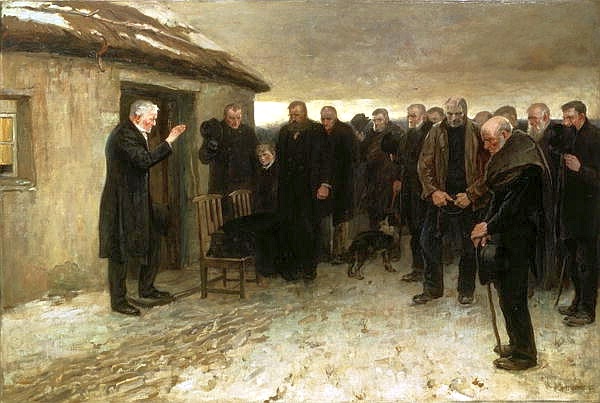Psalm 116 is the most visceral in the entire book.
Anxiety, despair, God’s mercy, salvation. It’s all there.
A Psalm couldn’t get more Psalmy than Psalm 116.
These days, verse 15 is one of its most neglected, but comforting: “The Lord cares deeply when his loved ones die.” (NLT).
Christian culture often adopts Paul’s “Oh death, where is your sting?” mindset when a loved one dies, and that is, indeed, the logical end of Christianity — the beginning, the resurrection and glory.
We’re also prone to say, “To die is gain” (again, Paul), and then of course, there’s my favorite extra-Biblical exposition, C.S. Lewis’ “The Weight of Glory.”
(If that thing were read at every funeral, the mourning Christians would start whispering to each other, “Hey, can you run to Home Depot and quickly grab a shovel or two,” and they’d all start digging their own graves. Mass burial event. Lewis really makes you want to be done with this world — and not from a feeling of despair, but excitement).
So there are many reasons why Christians can approach dying as if it were just being reborn into something better, somewhere better.
I get that.
But it’s important that we remember this verse, “The Lord cares deeply when his loved ones die.”
Most translations rightly say “precious in the sight of the Lord is the death of his saints,” but “precious” sends the wrong signal because we now think of something like a Huggies ad when we hear that word and not what’s intended in Hebrew which is closer to, “weighty” or “costly.”
In other words, The Lord recognizes what a weighty, costly thing it is when someone passes away.
It’s important to remember that for two reasons.
First, it’s the truth.
And second, in our Christian victory mindset, we’re prone to running roughshod over the sorrow of those who’ve seen their loved ones pass away.
We’re prone to cheer them up with promises of a better world, and I don’t think Jesus himself would do that.
He doesn’t see their death as something to celebrate (and, really, Christian culture sometimes borderline celebrates it or at least dismisses it to the point of callousness — see much of the evangelical church’s response to Covid), but God sees death as a weighty thing.
He never intended it for humans, and it’s something that brings him — God Almighty — immense sorrow. And Jesus, famously, tears.
If God — who knows exactly the glory in store for the one who passed away — still views death with such sacred sorrow, then how much more should we?
So if, right now, you’re mourning someone and the rest of your Christian friends are pushing you to move on, remember that the Lord isn’t.
The poet Eugene Gloria wrote, “Memory is another name for ghosts and their awful hunger.”
And if your spouse, your parent, your child dies, only you know the memory, its endurance, its ghost and that ghost’s awful hunger.
And while others move on, many days you will scarcely be able to move.
While other Christians try to nudge you from grief to the glory for the one you mourn, remember that it’s not the Lord nudging you.
He cares about their death and all the ways it haunts us. He never wanted this.
Yes, you can bank on what he’s got for them, right now and forever. And that’s wonderful.
But you can also count on what he’s got for you, here on earth, living in that ghost’s shadow — Christ’s shared sorrow and the simple phrase, “I know.”
When everyone else has moved on and you’re the only one left, sitting at the graveside, you’re actually not the only one left. Jesus is sitting with you.
Sure, he was there when they all were, for the formal affair with the typical verses, but he never left when the others did, when they moved on to their Sunday morning praise songs and coffee, leaving you alone.
He will remember everything with you, for as long as you do, and will never dishonor their memory or your pain.
[Painting: A Highland Funeral, James Guthrie]

